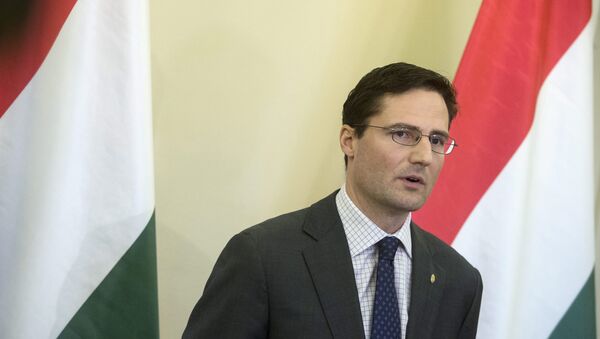Sputnik: You previously have said that "We need a sensible, insightful debate on the EU's reform". What do you see as the major drawbacks of the current reforms?
Márton Gyöngyösi: In the last few years I have seen a very positive change in the European Union: a productive debate has emerged on the future of the community, its values and principles. We hear politicians and decision-makers talking about their reform plans and ideas. We also have our opinion on how to reform the EU and we are happy to see that some of our topics have partially been addressed in the institutions of the EU. I could mention the social pillar that is of key importance and is necessary for further steps to realise the Wage Union, a goal Jobbik started to promote earlier. Such debates are good and can contribute to a better and more functioning EU. There might be differences of opinions, however they are not drawbacks but problems that should be solved jointly.
Sputnik: In your view, what kind of reforms does the EU need?
Márton Gyöngyösi: The EU needs more solidarity. If we want to see a stable EU, we need to work more on cohesion policies and reduce economic differences between the Eastern and the Western regions especially in the field of wages and living standards. However, this is only feasible if we stand up against corruption and authoritarianism. We have to have a common understanding on key values like the role of Christianity, democracy, and justice.
Sputnik: Hungarian President Viktor Orbán has often been criticised by other European leaders for his fairly stringent migration policy. Meanwhile, you said that the Orban's border fence was erected in vain, as Hungary is still an easy-to-access transit country. What is your vision for Hungary's migration policy?
Márton Gyöngyösi: Viktor Orbán is not criticised because of his migration policy. He is criticised because of his corruption and anti-democratic measures. His migration policy was right in 2015 and in the end his policy has proved to be right throughout Europe. But this does not entitle him to shut down opposition newspapers, use independent state authorities for his political purposes, capture the state, spread fake news, impose fines on opposition parties during campaigns, intimidate people and build a one-party system. This is the reason why he is criticised and European politicians are right to criticise him. At the same time Hungary is still an easy-to-access transit country, especially since governing Fidesz has started to settle workers from third countries due to a labour shortage.
READ MORE: Macron Reveals Europe's 'Main Enemies' as He Warns of 'Existential Risk' to EU
Sputnik: What steps should be taken to improve it?
Márton Gyöngyösi: Jobbik is very clear on the issue of migration: we would like to give perspective to Hungarian people and not foreigners. Borders should be protected and this is what we expect on an all-European level, with coordination among European states. At the same time Hungary, as every civilised country, has an obligation towards refugees and asylum seekers and the hate-speech campaigns of Orbán are unacceptable.
Sputnik: We see that right-wing parties are becoming more and more popular in Europe. What do you link this with?
Márton Gyöngyösi: You mean right-wing populist parties? Following the recent FPÖ-scandal in Austria, I'm not sure their popularity will rise. The founding fathers of the European Union established this community on centre-right principles: Christian values, solidarity, democracy and I hope that these kinds of parties will remain the leading force in the EU. In tougher periods there might be some changes, especially when other powers are interested in undermining stability in Europe, but I think that populism will lose its appeal in the long run.
Sputnik: What are your predictions with respect to the outcome of the upcoming elections?
Márton Gyöngyösi: I do not expect any major changes.
Sputnik: Talking about the other top priorities, you said that "the brain and hand drain are an area of major concern". Could you tell us about that in more detail?
Márton Gyöngyösi: More than 600,000 Hungarians have already left Hungary since our accession to the European Union and further hundreds of thousands are thinking about it. Every 6th Hungarian child is now born abroad. This is due to the low wages and almost non-existent labour rights that is a characteristic not only of Hungary but all the countries in Central Europe. We have received billions of Euros from the EU, yet we could not recover our economy and reach Western standards. We can mention the responsibility of the EU in it, since they really have not monitored cohesion funds strictly, but we cannot deny that governments like Orbán's have channeled these funds and resources to their oligarchs.
READ MORE: Czech Party: 'Only Way' to Become 'Independent and Free' Again is to Exit EU
Sputnik: In your opinion, how is Hungary supposed to deal with it?
Márton Gyöngyösi: We hope that it is still not too late to change. But we have two conditions, an economic and a political one: we have to quit the economic policy based on cheap labour and have to invest more in research and development to be able to raise productivity. On the other hand we have to break the rule of oligarchs and turn back from the authoritarian path, paved by Orbán.
Sputnik: In terms of Hungary's transformation and reformation process, what is the highest priority for the Jobbik party?
Márton Gyöngyösi: In contrary to Orbán's vision of a closed authoritation country based on poor and dependent people, forced to work for low wages on the periphery of Europe, we would like to see a successful and proud, democratic Hungary in a strong and stable European Union.

